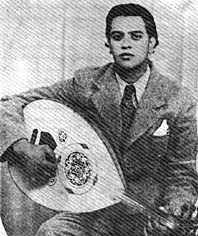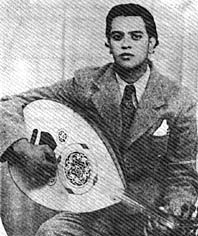
Ba-Makhrama: A Forgotten Singer [Archives:1998/29/Culture]
July 20 1998

His car radio was on, and Ba-Makhrama was singing one of his popular songs – “Ala Ba-yazoorani al-mahboob” – My lover will visit me tonight. Saqqaf, a highly time-oriented man, arrived at his destination, but the song was still playing. He did not switch off the radio. He remained in his seat listening, until the song was over.
Indeed, Ba-Makhrama has that kind of hold on people, even those who are not particularly into music.
Abdul-Qader Ba-Makhrama is an outstanding artist, who was one of the first people to introduce the traditional Yemeni song to the countries of the Horn of Africa. Thanks to him, Yemeni songs and music became deeply rooted among audiences there. His melodious, warm voice had a great role in popularizing Yemeni songs and in giving them a distinct place and popularity among local African people and Yemeni expatriates.
Ba-Makhrama was born in Djibouti in 1926 to parents originally from Ghail Ba-Wazir in Hadhramaut. He belongs to a family of religious scholars. However, he deviated from the family tradition. He learned French and worked as an electrician at the post and telegraph company in Djibouti.
Ba-Makhrama’s long journey with art started early in his life while he was a pupil at the primary school, to be precise. He joined the school choir, and his beautiful voice quickly drew the attention of his music teachers, who encouraged him a lot.
Another group of people found use for his strong voice. Muslim preachers used him to loudly chant religious hymns at mosques. That was useful before the advent of loudspeakers.
His talent and love of music drove him to study how to play the lute, aided by his maternal uncle who was enamored with music and owned a traditional 4-stringed Yemeni lute or Qanbous. Ba-Makhrama gained a high degree of proficiency in playing the lute, and started his singing career by performing the popular songs of Al-Mass. He was also influenced by Djibouti’s first singer Ibrahim Saeed.
Soon, the young singer started to be known within the society of Yemeni qat-chewing sessions. In addition to ordinary and cultural conversations at such gatherings, a singer was usually invited to play, sing and perform. Thus, the road to fame started.
Abdul-Qader started to make a name for himself during the early 1950s, encouraged by a number of enthusiastic friends and fans. The breakthrough, however, came in the mid-1950s when Ba-Makhrama went to Aden where he sang, and the Aden radio broadcast some of his songs. This gave him instant popularity and gained him much acclaim not only in Yemen, but also in the Gulf region. The unfortunate thing, however, is that Ba-Makharma did not record his songs at the newly established gramophone companies in Aden. As a result, many of them being forgotten.
Most of Ba-Makhrama’s songs were written by his brother Saeed, Dr. Mohammed Abdo Ghanim and Abu Bakar Al-Maanni. The latter also set them to music.
The creativity of this artist was also displayed by adopting Indian music and rhythms and harmonizing them with Yemeni words and poems. Indian music was very popular at the time due to the influence of Indian films widely shown in Aden cinemas.
Ba-Makhrama always worked hard on polishing and honing his talent; thus, immensely increasing his popularity among Yemeni expatriates in Africa, Yemenis in the old country, and Arabs in the Gulf and the rest of the Arabian Peninsula.
However, his talent in composing music or setting lyrics to music was rather limited. So the music he wrote for his songs was somewhat not up to standard, a thing which started to diminish his popularity. People were still enamored by his Indian-style songs.
The official cultural bodies and the Yemeni media in general failed to help Ba-Makhrama, which further reduced the popularity of his songs. Other less talented singers became more famous due to media hype.
Today, we can do much to rehabilitate and better appreciate this exceptional singer. We will only be doing the right thing!
Saleh Abdulbaqi,
Yemen Times Music Editor
——
[archive-e:29-v:1998-y:1998-d:1998-07-20-p:./1998/iss29/culture.htm]


